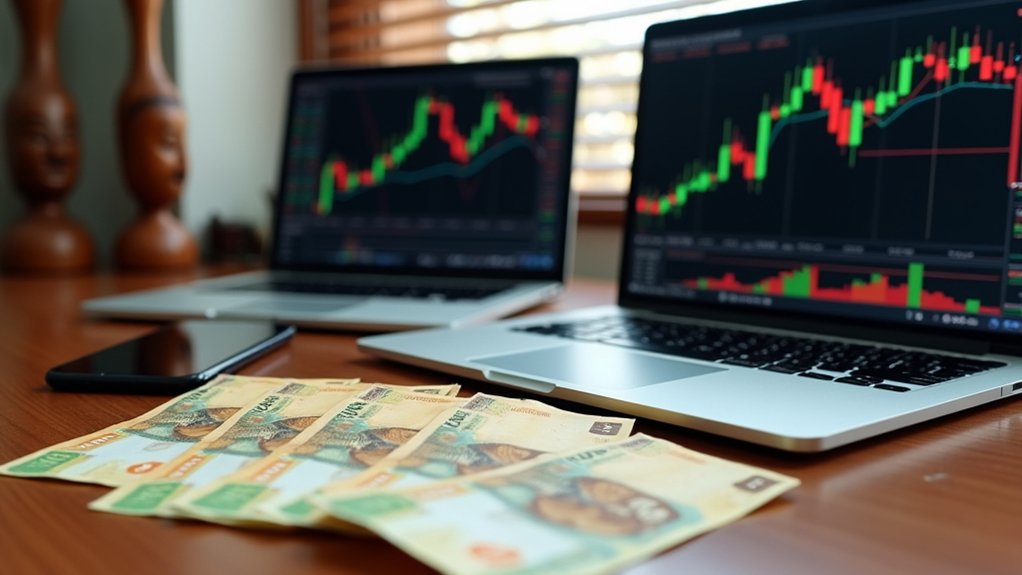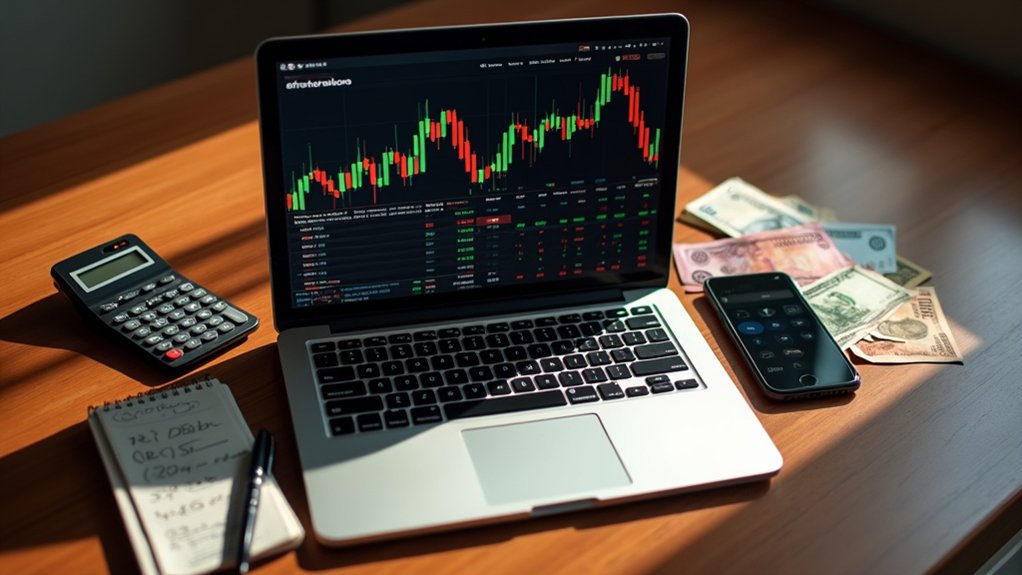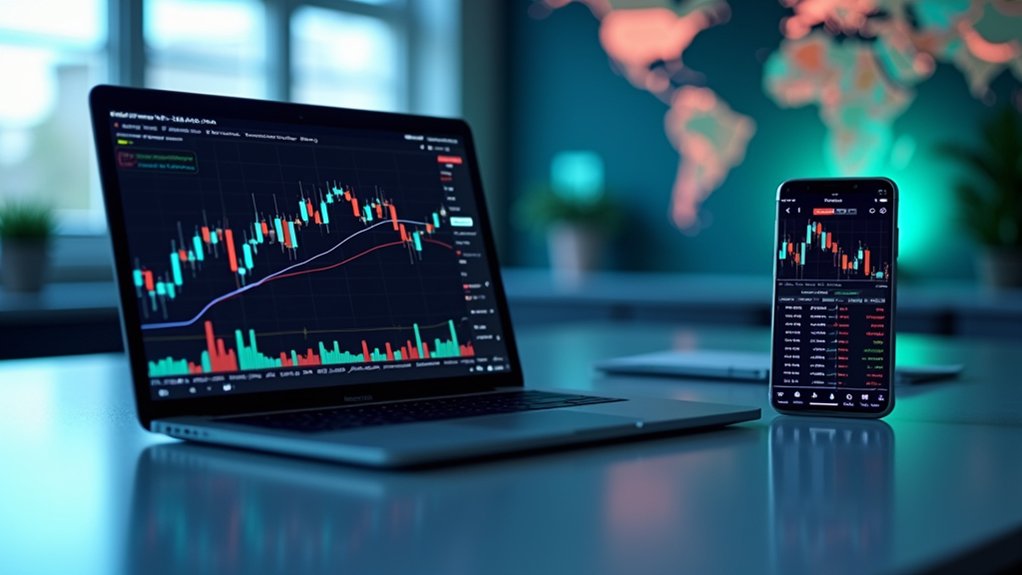AvaTrade (Official Site 🔗) operates across multiple African countries with FSCA registration covering South African traders, but the experience varies wildly depending on location. The broker offers MT4, MT5, and proprietary tools with spreads starting around 1.5 pips on major pairs and a fifty-dollar inactivity fee after three months. Regulatory oversight exists, funds get segregated, and the platform has been around for over 17 years. Payment options and market access remain patchy across the continent, though, creating a frustrating patchwork of availability that demands closer examination of country-specific limitations.

For traders across the continent, AvaTrade presents itself as another option in a crowded field of international brokers. The platform operates under multiple regulatory licenses including ASIC, FSA, CBI, BVI, FSCA, FRSA, CySEC, ISA, and JFSA. That's a lot of acronyms. For African traders, the FSCA registration matters most since it covers South African operations. But being regulated doesn't mean the trading experience will be perfect.
AvaTrade offers the standard platforms: MT4, MT5, plus their proprietary tools like Ava Social for copy trading and Ava Protect for risk management. Trading Central comes bundled in for market analysis. The platform supports multiple languages, which helps when handling account issues or deposit problems. Because those will happen.
The fee structure follows the typical broker playbook. Spreads start from 0.03 pips on select accounts, but that's marketing language. The average spread on major pairs sits around 1.5 pips. No direct commissions, just markups on raw spreads. It's the same game with different packaging. Withdrawal and deposit fees aren't charged by AvaTrade directly, but third-party payment processors will take their cut. That matters when moving money across African banking systems where transaction costs stack up fast.
The inactivity fee stings. Fifty dollars after three months of dormancy. For traders in countries where that's significant money, it's worth remembering. Currency conversion fees apply too, depending on the base account currency chosen.
AvaTrade provides access to forex pairs including some exotic combinations, CFDs on stocks and indices, commodities, cryptocurrencies, and ETFs. The range is decent. Whether African traders can actually access all these instruments depends on their specific country and account type. The fine print always matters. The broker's track record spans over 17 years in the industry with documented customer satisfaction metrics.
Payment methods vary by region. What works smoothly in Nigeria might not function in Zimbabwe or Tanzania. Banking infrastructure across the continent remains uneven. Mobile money options exist in some markets but not all. Wire transfers work but come with delays and costs. Understanding forex trading regulations in South Africa helps traders navigate the legal requirements and compliance standards expected in the market.
Security features include fund segregation, encryption, and two-factor authentication. These are baseline expectations now, not special benefits. Client funds separated from company assets means something if the broker faces financial trouble. Segregated client funds ensure that trader deposits remain protected and cannot be used for the broker's operational expenses or creditor claims. Maybe it protects traders, maybe it just delays problems. The Financial Sector Conduct Authority oversees forex brokers operating in South Africa to ensure they maintain market integrity and provide trader protection. Among the various regulatory licenses, the FSA Seychelles registration provides oversight for certain international trading operations. Account transparency tools allow traders to view the breakdown of three separate commissions including broker fees, exchange fees, and NFA fees where applicable.
AvaTrade operates in several African countries, though availability isn't universal. Regulatory compliance varies by jurisdiction. The platform works, the instruments trade, the spreads cost money. It's functional. Whether it's the right choice depends on individual circumstances, local alternatives, and realistic expectations about what international brokers actually deliver to African markets.
Common Questions
Does Avatrade Accept Deposits in Local African Currencies Like Naira or Cedi?
No, AvaTrade doesn't accept Naira or Cedi deposits directly. Nigerian and Ghanaian traders must fund accounts in USD, EUR, or GBP only.
Local currency gets converted at prevailing bank rates during deposit—often costing extra through exchange spreads. There's no NGN or GHS base currency option. Everything runs through international channels since AvaTrade lacks local currency integration.
Bank wires, cards, and e-wallets work, but all transactions happen in foreign currencies, not local African money.
Can I Withdraw Funds to Mobile Money Wallets Like M-Pesa or MTN?
No. AvaTrade doesn't support mobile money withdrawals like M-Pesa or MTN Mobile Money.
Withdrawal options stick to the usual suspects: bank wires, credit cards, PayPal, Skrill, Neteller, WebMoney. That's it.
The broker follows strict global compliance standards through its FSCA license in South Africa, which means local wallet infrastructure gets ignored.
Other African-focused brokers are adding mobile money, but AvaTrade isn't one of them.
If M-Pesa matters, look elsewhere.
Does Avatrade Have Physical Offices or Support Centers in African Countries?
AvaTrade has one physical office in Africa, located in Johannesburg, South Africa at Nelson Mandela Square, Sandton.
It's regulated by the FSCA and operational since 2016.
That's it.
No offices in Nigeria, Kenya, Egypt, or anywhere else on the continent.
Support for other African countries is entirely remote—phone, email, chat.
If you're not in South Africa, you're dealing with AvaTrade digitally.
No walk-in branches elsewhere.
Are There Withdrawal Delays When Sending Funds to African Bank Accounts?
Yes, there are delays. AvaTrade processes withdrawals within 24–48 hours, but wire transfers to African banks take 5–10 business days to land.
Bank clearance times drag things out further. Intermediary banks add unpredictable hold-ups beyond AvaTrade's control.
E-wallets are faster—usually 24 hours once approved. Exchange rate shifts and currency conversion by local banks complicate timing and amounts received.
Third-party fees eat into what arrives, even though AvaTrade covers up to $100 in transfer costs.
Does Avatrade Charge Extra Fees for African Payment Methods or Banks?
AvaTrade doesn't slap extra fees on African payment methods or banks directly. Deposits and withdrawals are free from their end.
But here's the catch: third-party processors, local banks, and mobile money networks often charge their own fees—especially for cross-border transfers or currency conversion. African traders using non-USD accounts will hit conversion charges too. AvaTrade stays hands-off, but the payment chain between them and your African bank? That's where costs sneak in.










